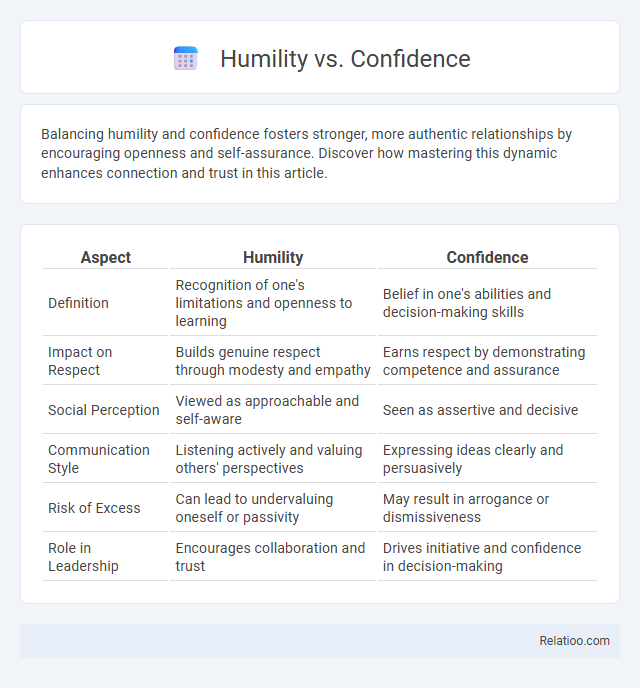Balancing humility and confidence fosters stronger, more authentic relationships by encouraging openness and self-assurance. Discover how mastering this dynamic enhances connection and trust in this article.
Table of Comparison
| Aspect | Humility | Confidence |
|---|---|---|
| Definition | Recognition of one's limitations and openness to learning | Belief in one's abilities and decision-making skills |
| Impact on Respect | Builds genuine respect through modesty and empathy | Earns respect by demonstrating competence and assurance |
| Social Perception | Viewed as approachable and self-aware | Seen as assertive and decisive |
| Communication Style | Listening actively and valuing others' perspectives | Expressing ideas clearly and persuasively |
| Risk of Excess | Can lead to undervaluing oneself or passivity | May result in arrogance or dismissiveness |
| Role in Leadership | Encourages collaboration and trust | Drives initiative and confidence in decision-making |
Understanding Humility: Core Principles
Understanding humility involves recognizing your limitations while valuing others' contributions, fostering genuine self-awareness and growth. Confidence stems from a balanced belief in your abilities without overshadowing humility's emphasis on openness and respect. Embracing humility allows you to build authentic relationships and navigate challenges with a grounded perspective.
Defining True Confidence
True confidence is rooted in self-awareness and humility, recognizing one's strengths while accepting limitations without arrogance. It balances assertiveness with openness, allowing individuals to express themselves authentically and take risks without fear of failure. Unlike false confidence, genuine confidence fosters resilience and continuous growth through honest self-assessment and willingness to learn.
Key Differences Between Humility and Confidence
Humility involves recognizing one's limitations and valuing others' contributions without seeking validation, while confidence reflects a strong belief in one's abilities and decisions. Key differences include humility's emphasis on openness to learning and acknowledgment of imperfections, contrasting with confidence's focus on self-assurance and assertiveness. Unlike humility, which fosters collaboration and growth, confidence drives proactive action and risk-taking.
How Humility Enhances Personal Growth
Humility enhances personal growth by fostering self-awareness and openness to feedback, which drives continuous improvement and learning. It encourages embracing mistakes as valuable lessons rather than setbacks, promoting resilience and adaptability. Balancing humility with confidence allows individuals to pursue goals assertively while remaining receptive to growth opportunities.
The Role of Confidence in Achieving Success
Confidence serves as a critical driver in achieving success, enabling individuals to take risks, make decisive actions, and pursue goals with perseverance. It fosters a positive self-image and resilience, which are essential for overcoming obstacles and maintaining motivation in competitive environments. Balancing confidence with humility ensures openness to learning and adaptation, enhancing personal growth and sustainable success.
Common Misconceptions: Humility vs Arrogance
Humility is often mistaken for low self-esteem or weakness, but it actually embodies an accurate self-assessment and openness to growth, contrasting sharply with arrogance, which involves an inflated sense of self-importance and disregard for others. Confidence stems from a realistic belief in one's abilities and maintains respect for others, while arrogance dismisses their value. Understanding these differences is crucial for personal development and fostering genuine relationships.
Balancing Humility and Confidence in Daily Life
Balancing humility and confidence in daily life involves recognizing one's strengths without arrogance while remaining open to growth and learning. Effective balance enhances interpersonal relationships and promotes authentic self-awareness by valuing both self-assurance and modesty. Cultivating this equilibrium supports personal development and fosters resilience in various social and professional contexts.
Impact of Humility and Confidence on Relationships
Humility fosters trust and openness in relationships by encouraging active listening and sincere appreciation of others' perspectives, creating a strong emotional connection. Confidence inspires respect and assurance, enabling you to express your ideas clearly and assertively, which strengthens mutual understanding and collaboration. Balancing humility and confidence is crucial for maintaining healthy relationships, as it allows you to be both self-assured and empathetic, enhancing communication and emotional bonds.
Building Confidence Without Losing Humility
Building confidence without losing humility requires balancing self-assurance with a genuine recognition of your limitations and openness to growth. Embracing humility allows you to stay grounded, learn from others, and avoid arrogance while projecting authentic confidence in your abilities. Cultivating this equilibrium enhances leadership, fosters respect, and creates lasting personal and professional connections.
Strategies for Cultivating Humility and Confidence
Cultivating humility involves embracing self-awareness, recognizing your limitations, and seeking feedback to foster continuous growth, while building confidence requires setting achievable goals, celebrating small wins, and practicing positive self-talk to reinforce your abilities. Balancing humility and confidence empowers you to stay grounded while pursuing ambitions, enhancing interpersonal relationships and personal development. Employing mindfulness techniques and surrounding yourself with supportive mentors can further strengthen both humility and confidence effectively.

Infographic: Humility vs Confidence
 relatioo.com
relatioo.com